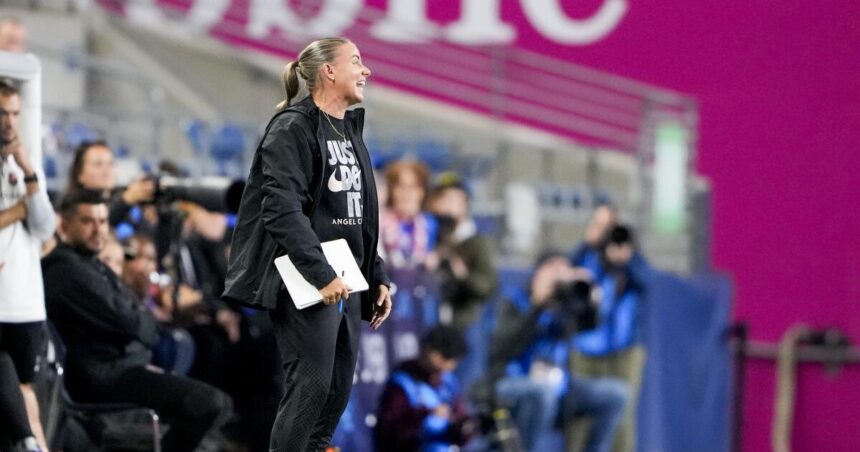When joined the NWSL, the goal was to make the franchise more than just a soccer club. Its sprawling, deep-pocketed and wanted the team to win on the field, but it also wanted to alleviate hunger, support education and promote equality.
It was an innovative approach; one that, if it succeeded, would provide a new template for how teams interacted with the fans and communities they served.
Yet three years later, Angel City has made good on only half that agenda.
Even before drawing the Utah Royals on Sunday in the home finale, the team was eliminated from playoff contention for the second time. Angel City (7-12-6), which will conclude its third season on Nov. 1 in Portland, has won just a third of its 69 games, conceded more goals than it has scored and ranks among the league leaders in the number of times it has been fined or penalized by the NWSL for violating league rules.
The performance on the field is regressing, not progressing. With the team under new management, massive change on the soccer side could be coming, sooner rather than later.
But the other half of Angel City’s experiment is going well. Last week the team announced it has joined with jersey sponsor Door Dash to deliver more than 2 million meals to needy individuals in Los Angeles. Alongside other corporate partners, who must pledge 10% of their sponsorship dollars to community programs, the club has distributed more than 237 tons of fresh produce, trained 164 women coaches, mobilized 1,300 people to contribute more than 4,200 volunteer hours to nonprofit groups throughout the city, helped fund a soccer program for migrant families stranded at the U.S.-Mexican border, and organized gender-equity summits at the 2023 Women’s World Cup and 2024 Olympics.
Whether the team can continue doing good in the community without doing well on the field is an open question, however.
Sportico puts the franchise’s value at $250 million and lists its annual revenue at $35.4 million; both are records for a women’s professional team. And while the league lists the team’s average home attendance at 19,310, that’s based on tickets distributed, not a turnstile count; more than a third of BMO Stadium’s 22,000 seats were empty for Sunday’s Fan Appreciation Day home final.
Attendance isn’t the only thing that has stalled. Whatever momentum the team got from its star-studded investors — the largest majority-female ownership group in sports history and one that includes Hollywood A-listers Natalie Portman, Eva Longoria, America Ferrara and Jennifer Garner as well as former athlete, including Mia Hamm, Julie Foudy, Billie Jean King and Serena Williams — has faded as well. The team has gone through two coaches and two general managers in three seasons while , its biggest box-office draw, hasn’t started a game in more than two years.
Attention and investment in women’s sports is burgeoning yet Angel City, which plays in a league built on star power, was the only NWSL team that didn’t have a player suit up in last summer’s Olympic tournament. While none of its prominent civic-minded sponsors have closed their checkbooks and gone elsewhere — yet — fans and even some of the team’s original investors are losing patience.
“This season has been a disappointment,” said Laura Stribling, a playwright from Santa Clarita and a season-ticket holder from the team’s inception. “I don’t know who is to blame.”
Neither , the club president, nor , who became the team’s controlling owner last July, agreed to be interviewed, though Uhrman issued a 67-word written statement through a club spokeswoman.
“After the season,” it said in part “we will review, plan and make the necessary changes to win. Not just to make the playoffs, but to win the whole thing.”
That could be bad news for coach Becki Tweed and general manager Angela Hucles Mangano, who have had little success halting the team’s slide, but welcome news for Angel City’s investors. None of team’s financial backers, like the team’s owner or president, would speak on the record given the delicate nature of the situation, but privately many have expressed frustration with the team’s lack of progress: This season’s seven wins with a game to play is a franchise low and there appears to be no plan for turning things around.
Even before the season started there was tension in Angel City’s ownership group. Last spring Reddit co-founder Alexis Ohanian, at the time the team’s largest shareholder, was so unhappy with the board’s profligate spending on nonsoccer things he pushed the board’s other five members to enlist the help of a New York investment bank in finding a new controlling owner.
Ohanian did not respond to emails seeking comment but in July, Bay, dean of the USC Annenberg School for Communication and Journalism, and her husband, Disney CEO Bob Iger, spent $50 million to take over the team. They were welcomed, days later, by a relating tales of infighting, politics and backstabbing among some of the Angel City owners that was worthy of a soap opera.
Bay is reportedly learning as much as she can about soccer ahead of what figures to be a busy winter spent remaking the team’s front office and soccer operations department. Angel City will also see 10 players — including Press, leading scorers Sydney Leroux and Claire Emslie and goalkeeper Did Haracic — become unrestricted free agents, according to the Spotrac website.
Yet the losing on the field and the dysfunction off it doesn’t have to derail Angel City’s wildly successful community efforts, said Lisa Delpy Neirotti, an associate professor of sports management who helped develop the Sport Philanthropy Certificate program at George Washington University.
“I don’t see that correlation,” she said. “People who manage the philanthropic side are different than the coaches and the talent. So you can have great people doing one part of the business and maybe they just don’t have the right people taking care of the talent side of the business.”
If sponsors and fans begin to lose interest, that could change the equation, Delpy Neirotti said. But she suspects many of Angel City’s partners got involved with the team because they were interested in more than winning soccer games.
“Where they’re more coming from is the long-term impact, supporting women, supporting people in need, and making this really community focused,” she said.
That work, said Brandy Muñiz, executive director of the All Peoples Community Center in South L.A., is having an impact.
“Angel City is actually committed to the mission, to their values,” Muñiz said. The team has provided meals, helped fund a financial literary course for young people and provided laptops, scholarships and mentoring for a women’s support group at All Peoples.
“It’s been refreshing because what it shows is a deep care and appreciation and value, not just for the center, our mission, but our community,” she added. “They genuinely care about the people that use our resources.”
While that’s good, for an ambitious team that once promised to revolutionize women’s sports it’s not nearly good enough.
“I do expect more,” said Stribling, the playwright and season-ticket holder. “I really like the community outreach work the team does and the philosophy behind the club. However we are a soccer team and we need to win.”










